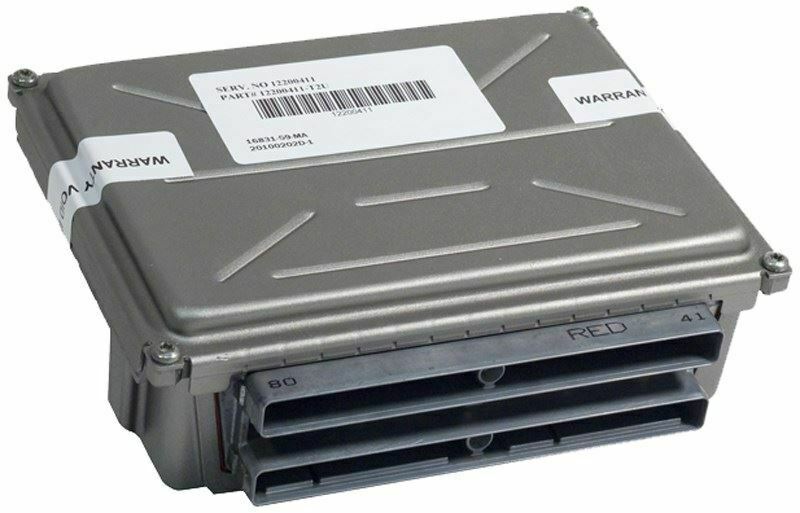Is Your Buick Regal or GM 3.8L Vehicle Running Rough?
The Powertrain Control Module, or PCM, is the electronic brain of your vehicle’s engine and transmission. For owners of the 2003-2004 Buick Regal, Impala, Monte Carlo, and other GM vehicles equipped with the legendary 3.8L engine, a failing PCM can be the source of countless frustrating and hard-to-diagnose issues. From a persistent check engine light to stalling and poor fuel economy, a faulty module can make your reliable car feel unpredictable. This replacement PCM, part number 89017735, is the definitive solution to restore your vehicle’s performance, drivability, and reliability.
Diagnosing a Faulty Powertrain Control Module
When the PCM begins to fail, it can send incorrect signals to various engine and transmission components, leading to a wide array of symptoms. Often, these symptoms can be mistaken for a bad sensor or a mechanical issue, leading to expensive and unnecessary repairs. If you’re experiencing several of the issues below, the PCM is a likely culprit.
From the Diagnostic Bay
We had a 2003 Buick LeSabre come in with a complaint of intermittent stalling and a harsh 1-2 shift. The owner had already replaced the throttle position sensor and the mass airflow sensor based on codes he pulled, but the problem persisted. After hooking up our professional scan tool and monitoring live data, we noticed the PCM was commanding the torque converter clutch to lock and unlock erratically at low speeds, causing the stall. The module’s internal logic had failed. We installed a VIN-programmed PCM, performed the necessary security relearn, and the car drove like new. It’s a classic case of chasing symptoms when the root cause is the central computer itself.
Common Symptoms of a Failing PCM
- ✔ Check Engine Light: The light may be on constantly or intermittently, often with communication-related error codes (U-codes) or multiple, seemingly unrelated sensor codes.
- ✔ Engine Stalling or Misfiring: Your vehicle may stall unexpectedly while driving or at a stop, and you might experience random engine misfires.
- ✔ Poor Fuel Economy: A faulty PCM can’t properly manage the air-fuel mixture, leading to a noticeable drop in your MPG.
- ✔ Harsh or Erratic Shifting: The PCM controls the transmission’s shift points. Failure can lead to delayed, hard, or unpredictable shifting.
- ✔ No-Start Condition: In cases of complete failure, the PCM may not be able to activate the fuel pump or ignition coils, preventing the engine from starting at all.
- ✔ Failed Emissions Test: Incorrect engine management will almost certainly cause your vehicle to fail a smog or emissions inspection.
The Plug-and-Play Solution: Your Pre-Programmed 2003-2004 Regal PCM
Don’t let a bad module keep your car off the road. This replacement Powertrain Control Module is the most straightforward and reliable way to solve your vehicle’s electronic issues. We take the guesswork out of the repair. When you order, you simply provide us with your vehicle’s 17-digit VIN. Our technicians will then flash the module with the latest, most stable software updates directly from GM, ensuring it is a perfect match for your car’s specific configuration. This isn’t a generic, one-size-fits-all part; it’s a component specifically prepared for your vehicle.
This professional programming service means that for most vehicles, the installation is a simple plug-and-play process. Once installed, you may need to perform a simple security relearn procedure (often called a CASE learn or anti-theft relearn), which can typically be done without special tools. This ensures the new PCM communicates correctly with your vehicle’s anti-theft system and other modules.
Guaranteed Compatibility
This PCM is a direct replacement for service numbers 89017735 and 12583826. It is guaranteed to fit and function correctly in the following vehicles:
- 2003-2004 Buick Regal (LH engine compartment)
- 2003 Buick LeSabre (LH engine compartment, ID 12583826)
- 2003-2004 Buick Park Avenue (LH front engine compartment)
- 2003 Chevrolet Impala (3.8L, LH engine compartment)
- 2003 Chevrolet Monte Carlo (3.8L, LH engine compartment)
- 2003 Pontiac Bonneville (LH engine compartment, ID 12583826)
- 2003 Pontiac Grand Prix (3.8L, LH front engine compartment, ID 12583826)
By purchasing a pre-programmed 2003-2004 Regal PCM, you are not just buying a part; you are buying a complete solution that saves you a costly trip to the dealership for programming.
Frequently Asked Questions
What is a PCM and what does it do?
The Powertrain Control Module (PCM) is your car’s main computer. It controls all aspects of the engine’s operation, such as fuel injection, spark timing, and emissions, as well as the transmission’s shifting, to ensure optimal performance and efficiency.
Why do you need my VIN?
Your Vehicle Identification Number (VIN) contains critical information about your car’s specific options, engine, transmission, and emissions equipment. We use the VIN to load the exact GM-certified software and calibrations onto the PCM, ensuring it works perfectly with your vehicle right out of the box.
Is this part difficult to install?
Installation is typically straightforward for someone with basic mechanical skills. It involves disconnecting the battery, unplugging the electrical connectors from the old PCM, unbolting it, and then installing the new one in reverse order. The most important post-installation step is the security relearn procedure, which can often be done at home.
Will I need to do anything after installing this PCM?
In most cases, you will need to perform a security relearn procedure. This procedure syncs the new PCM with your vehicle’s anti-theft system. Instructions for this are widely available online or in service manuals and usually involve a sequence of turning the key in the ignition. A Crankshaft Variation Relearn (CASE) may also be needed, which requires a capable scan tool.
How do I know if my old PCM is actually the problem?
While the symptoms listed above are strong indicators, a definitive diagnosis is best. A qualified mechanic can test the PCM’s power, ground, and communication circuits. However, if you have multiple unrelated error codes, intermittent issues that are hard to trace, or have already replaced related sensors without success, the PCM is the most likely cause.


